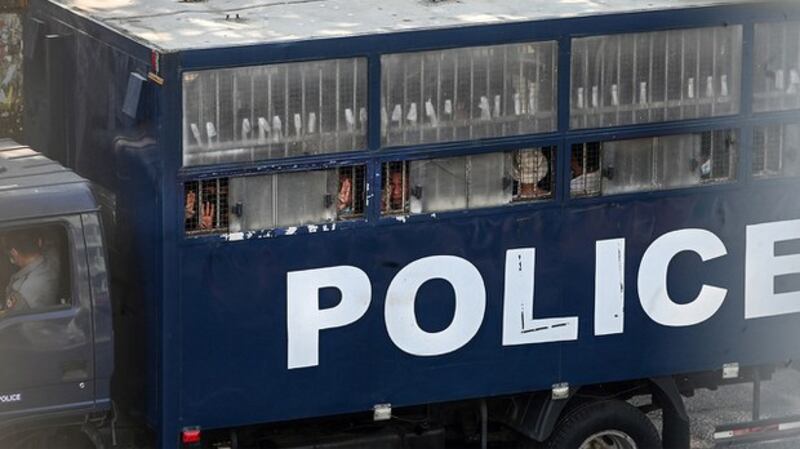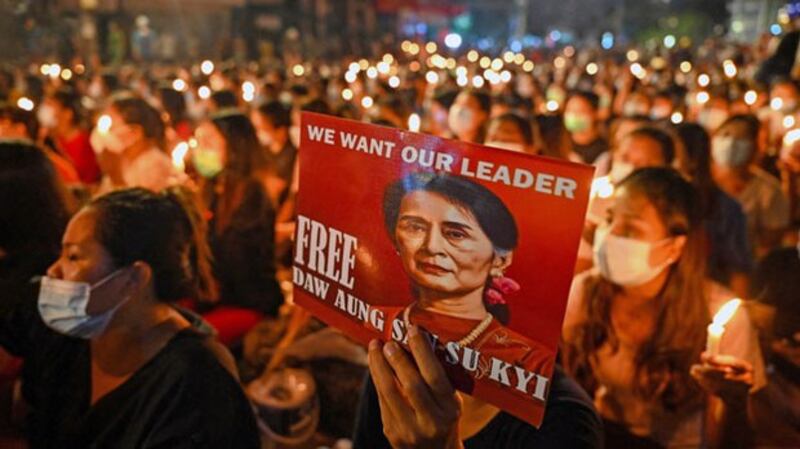Open warfare broke out Tuesday between troops loyal to Myanmar’s junta and members of the People’s Defense Force (PDF) militia in the country’s second largest city of Mandalay, leaving at least three people dead and one injured and prompting calls from foreign embassies for a cessation of violence.
Fighting erupted early in the morning as junta troops raided a PDF office in the city’s Chanmya Tharzi township, according to Mandalay PDF combat team leader Bo Zeegwat, who said militia members were forced to retreat in the face of the military’s superior firepower. The clashes marked the first in the cosmopolitan city of more than 1.7 million people since the military took over the government in a February coup, prompting widespread protests.
“It was just a small office with only a few people and supplies inside—they must have had informers to find the place,” he told RFA’s Myanmar Service.
“The building was surrounded and there were four snipers firing at us. We didn’t have enough manpower or weaponry, so we had to withdraw. A few of our guys got arrested and at least two were killed.”
Bo Zeegwat said the decision to pull out of the area came after the military fired rocket propelled grenades (RPGs) at the building, causing the loss of several PDF automatic weapons and improvised explosives.
He said there were eight members of the PDF in the office at the time of the attack but that he did not know exactly how many were killed or arrested.
The military issued a statement acknowledging that troops inspecting the area at around 7:30 a.m. were attacked with small arms fire and grenades. It said four people were killed in the firefight and eight were arrested by security forces, who also confiscated several weapons.
According to the military, a white Pajero SUV fired at troops before crashing into a power transformer after a brief chase, killing all four of the occupants. The statement said that “some members” of the military were seriously injured in the clashes but did not specify how many.
RFA was unable to confirm widespread reports that a lieutenant colonel and another army officer from the military’s Central Command were killed in the fighting.
Residents of Mandalay’s Amarapura and Pyigyi Dagun townships also reported bomb attacks on buildings occupied by security forces on Tuesday, although details were scarce.
Following the fighting, the military tightened security in several parts of the city, while roads leading to area hospitals were placed under strict surveillance. Many shops, restaurants, and bars remained closed as of Tuesday evening.
Meanwhile, clashes between the military and the PDF in Myanmar’s Sagaing region that touched off on Monday night continued through Tuesday morning, with both sides suffering casualties, according to local militia members.
A policeman, later identified as Win Moe Kyaw, was killed at around 9:30 p.m. on Monday when a vehicle convoy hit a mine while on patrol between Myaung township’s Kuto Kone and Hlay Tin Oo villages, said a member of the township’s PDF, who claimed responsibility for the attack.
“They came in three cars, and we blew them up with mines,” said the militiaman, speaking on condition of anonymity citing fear of reprisal. “One policeman was killed, and six others were wounded, two of them seriously.”
“From there, they drove straight to the Myaung police station and began firing at their surroundings. We suffered no casualties on our side.”
Attempts by RFA to contact junta spokesman Maj. Gen. Zaw Min Tun for comment on the clashes went unanswered Tuesday.
Tuesday’s clashes prompted the U.S. Embassy in Yangon to issue a statement saying that Washington was “disturbed by the military escalation” and calling for an urgent end to the fighting.
The Embassy of the Netherlands said the violence in Mandalay “highlights the emergent need to build a credible and sustainable crisis recovery process, to respect human rights and the choices expressed by the Myanmar people at the November 2020 general elections,” and to implement an agreement to stop bloodshed in the country adopted at a summit of the Association of Southeast Asian Nations (ASEAN) held in Jakarta in April.

Hundreds of ‘terrorists’ arrested
According to the Assistance Association for Political Prisoners (AAPP), the military has killed at least 875 people since it orchestrated a coup on Feb. 1, claiming that the ruling National League for Democracy’s (NLD) landslide victory in the country’s November 2020 election was the result of widespread voter fraud. The junta has yet to present evidence of its claims and security forces have responded to nationwide protests with deadly force.
AAPP says some 5,053 people have been detained, charged, or sentenced in the five months since the coup.
In a report issued on June 10 through the military-owned Myawaddy newspaper, the junta claimed that more than 600 of those arrested are “terrorists,” including “49 arsonists, 61 killers, 256 people with illegal weapons, and 272 bombers.” It said the arrests had resulted in the seizure of 50 small arms, more than 2,500 rounds of ammunition, 900 handmade guns, and nearly 6,000 anti-personnel mines.
However, family members of those arrested have dismissed the junta’s allegations, saying instead that they were simply unarmed protesters trying to make their voices heard, and that many will now face the stigma of having been labeled terrorists.
Ye Mon, defense minister of the shadow National Unity Government (NUG), told RFA that the people referred to in the junta’s report had been forced to protect themselves and others from the military.
“Given the current situation, it is clear that the people of Myanmar are defenseless,” he said.
“The international community has been unable to stop the junta’s atrocities, so the people have only one choice. It’s a matter of self-defense.”
The junta’s claims come as the AAPP reported over the weekend that at least 25 people have been killed by the military while in detention since February—the latest of which was a 27-year-old man named Thet Paing Htoo, who was beaten to death after being arrested on Saturday for his alleged involvement in anti-coup protests.
On Tuesday, New York-based Human Rights Watch said Myanmar’s security forces have arbitrarily detained thousands of people and subjected many to torture, routine beatings, and other ill-treatment since the coup.
In a statement, the group cited victims who described beatings, burnings from lit cigarettes, prolonged stress positions, and gender-based violence, including one 17-year-old boy who said he was tortured for days and later forced into a pit and buried up to his neck in a mock burial.
“Myanmar’s military authorities cannot be trusted to undertake serious investigations of allegations of torture, let alone to prosecute the police and military abusers,” said Manny Maung, Myanmar researcher at Human Rights Watch.
“The United Nations and concerned governments should publicly demand an end to torture and other abuse of detainees and make clear to the military that failure to comply will mean redoubled efforts to impose additional targeted sanctions on senior military and police officials, and military-owned enterprises.”

Court hearings underway
Also on Tuesday, a special court in the capital Myanmar held the second day of the second week of hearings for NLD leader Aung San Suu Kyi who, along with several other ruling party officials, was detained in the aftermath of the February putsch.
The country’s former State Counselor has been charged in six cases in the capital and one in Yangon. The charges—including violating the Official Secrets Act, bribery, incitement and sedition, violating the telecommunications law, possession of unlicensed two-way radios, and violating protocols set up to contain the spread of the coronavirus—are widely seen as designed to end her role in politics.
In Tuesday’s proceedings, the court heard arguments for motions to admit documents and photos submitted by the junta as evidence for the charges of incitement and sedition against Aung San Suu Kyi, as well as former President Win Myint and Myo Aung, the NLD’s chairman of the Naypyidaw Council. The proceedings also included the testimony of witnesses related to Aung San Suu Kyi’s charges of violating protocols set up to contain the spread of the coronavirus.
Her attorney Thae Maung Maung said his team had objected to the evidence submitted by prosecutors in the incitement and sedition case.
Aung San Suu Kyi’s trial, which began on June 14 and is being heard weekly on Mondays and Tuesdays, is expected to be completed within six months. If convicted on all counts, she could be sentenced to up to 39 years in prison, in addition to a life sentence.
The democracy icon and Nobel Peace Prize laureate, who turned 76 over the weekend, spent a total of 15 years under house arrest over a 21-year period that ended in 2010 under the country’s previous junta regime.
The NUG has said that Aung San Suu Kyi and other detained NLD leaders were unlawfully arrested and rejected the charges against them.
Reported by RFA’s Myanmar Service. Translated by Khin Maung Nyane and by Ye Kaung Myint Maung. Written in English by Joshua Lipes.
